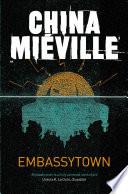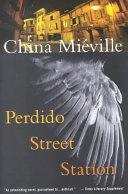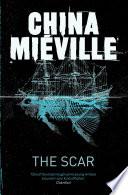Works

Un Lun Dun
China Miéville
Iron Council
China Miéville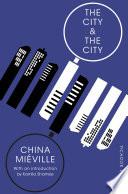
The City & the City
China MiévilleThe 9th Technique
China Miéville
Kraken
China MiévilleThe Dusty Hat
China MiévilleThe Tain
China MiévilleThe Design
China MiévilleKeep
China MiévilleAfter the Festival
China MiévilleDetails
China MiévilleThe Junket
China MiévilleGo Between
China MiévilleDreaded Outcome
China Miéville
King Rat
China MiévilleLooking for Jake
China Miéville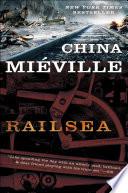
Railsea
China MiévilleFamous China Miéville Quotes
“I wish that there was nothing to hold me here, that gravity was a suggestion I could ignore.”
Source: Perdido Street Station
Source: Embassytown (2011), Chapter "Formerly, 2"
China Miéville Quotes about the trip
“The dead are way more organized than the living.”
Source: Un Lun Dun
interview with Joan Gordon http://www.depauw.edu/sfs/interviews/mievilleinterview.htm
interview with Joan Gordon
“Anamnesis” (p. 191)
Iron Council (2004)
Source: Perdido Street Station (2000), pp. 145-146
China Miéville: Trending quotes
China Miéville Quotes
“So I want to have monsters as a metaphor but I also want monsters because monsters are cool.”
interview with 3am
Context: The thing about good pulp is that you trust the reader and you know that the mind is a machine to process metaphors so of course all those connections will be there. But you've also granted the fantastic its own dynamic and allowed that awe. There's no contradiction. So I want to have monsters as a metaphor but I also want monsters because monsters are cool. There's no contradiction.
Interview with Joan Gordon
Context: There’s simultaneously something rigorous and something playful in genre. It’s about the positing of something impossible—whether not-yet-possible or never-possible—and then taking that impossibility and granting it its own terms and systematicity. It’s carnivalesque in its impossibility and overturning of reality, but it’s rationalist in that it pretends it is real. And it’s that second element which I think those who dip their toes in the SF pond so often forget. They think sf is “about” analogies, and metaphors, and so on. I refute that—I think that those are inevitable components, but it’s the surrendering to the impossible, the weird, that characterizes genre. Those flirting with SF don’t surrender to it; they distance themselves from it, and have a neon sub-text saying, “It’s okay, this isn’t really about spaceships or aliens, it’s about real life,” not understanding that it can be both, and would do the latter better if it was serious about the former.
Interview with Joan Gordon
Context: There’s simultaneously something rigorous and something playful in genre. It’s about the positing of something impossible—whether not-yet-possible or never-possible—and then taking that impossibility and granting it its own terms and systematicity. It’s carnivalesque in its impossibility and overturning of reality, but it’s rationalist in that it pretends it is real. And it’s that second element which I think those who dip their toes in the SF pond so often forget. They think sf is “about” analogies, and metaphors, and so on. I refute that—I think that those are inevitable components, but it’s the surrendering to the impossible, the weird, that characterizes genre. Those flirting with SF don’t surrender to it; they distance themselves from it, and have a neon sub-text saying, “It’s okay, this isn’t really about spaceships or aliens, it’s about real life,” not understanding that it can be both, and would do the latter better if it was serious about the former.
interview with Joan Gordon
Context: Although we revolutionary socialists are always accused of being Utopian, nothing strikes me as more Utopian than the reformist belief that with a bit of tinkering and some good faith, we can systematically improve the world. You have to ask how many decades of broken promises and failed schemes it will take to disprove that hope. Marxism isn’t about saying you’ll get a perfect world: it’s about saying we can get a better world than this one, and it’s hard to imagine, no matter how many mistakes we make, that it could be much worse than the mass starvation, war, oppression, and exploitation we have now. In a world where 30,000 to 40,000 children die of malnutrition daily while grain ships are designed to dump food into the sea if the price dips too low, it’s worth the risk.
on winning the Hugo Award in 2010, asked in a conference in France http://www.youtube.com/watch?v=o70YRXlhopY&feature=related
Context: But it's a prize that... if you're into science-fiction and fantasy you grow up reading books with "Hugo [Award-winner]" on the cover. And this is very, very moving, to be in that position oneself. It's an odd situation [too], because, as you say, it was a tie, which is very rare with the Hugo, which has happened, like three times over sixty years, or something. But I prefer to think of it as a quantum Hugo and that Paolo Bacigalupi and I oscillate between between Hugo particle and wave form, this year. So it's properly science-fictional.
“Scars are memory. Like sutures. They stitch the past to me.”
Source: The Scar
Source: Perdido Street Station
“… where's the skill in being a hero if you were always destined to do it?”
Source: Un Lun Dun
Source: Looking for Jake and Other Stories
“It is more foolish and childish to assume there is a conspiracy, or that there is not?”
Source: The City & the City (2009), Chapter 13 (p. 141)
“Ori supposed there were as many unspeakable stories as there were men come back from war.”
Part 4 “The Hainting”, chapter 15 (p. 314)
Iron Council (2004)
Part 2 “Returns”, chapter 8 (p. 85)
Iron Council (2004)
“It had some allies. Believe me, there’s nothing so terrible that someone won’t support it.”
Source: Un Lun Dun (2007), Chapter 22, “History Lessons” (p. 90)
Source: Un Lun Dun (2007), Chapter 3, “The Visiting Smoke” (p. 11)
Part 4 “The Hainting”, chapter 15 (p. 319)
Iron Council (2004)
“Throw something away and you declare it obsolete.”
Source: Un Lun Dun (2007), Chapter 12, “Safe Conduct” (p. 52)
Source: Perdido Street Station (2000), p. 553
Source: Perdido Street Station (2000), p. 32
Part 3 “Wineland”, chapter 12 (p. 130)
Iron Council (2004)
“When the rich grow afraid, they get nasty. We say: A government for need not greed!”
“Anamnesis” (p. 222)
Iron Council (2004)
“Neither dust nor light stirred. It was as if time had been bled dry and given up.”
Part 3 “The Compass Factory”, chapter 20 (p. 241)
The Scar (2002)
“She felt so alien, bowed under culture shock as crippling as migraine.”
Part 2 “Salt”, chapter 6 (p. 78)
The Scar (2002)
Source: Perdido Street Station (2000), p. 188
Source: Perdido Street Station (2000), p. 607
Part 1 “Channels”, Interlude II (p. 65)
The Scar (2002)
“There is no theology so desperate that you can’t find it.”
Source: The City & the City (2009), Chapter 4 (p. 38)
“We’re all racing,” he said.
“Yeah, but some of us in the wrong direction.”
Part 6 “The Caucus Race”, chapter 20 (p. 364)
Iron Council (2004)
“Socialism and SF are the two most fundamental influences in my life.”
interview with Joan Gordon
Source: Perdido Street Station (2000), p. 51
China Mieville: "My job is not to try to give readers what they want..." http://www.theguardian.com/childrens-books-site/2012/sep/20/china-mieville-interview, theguardian.com, Thursday 20 September, 2012.
Source: Perdido Street Station (2000), p. 188
Source: The City & the City (2009), Chapter 13 (p. 139)
Source: Un Lun Dun (2007), Chapter 12, “Safe Conduct” (p. 53)

